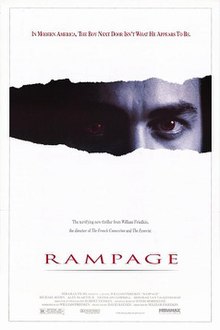Rampage (1987 film)
| Rampage | |
|---|---|

Promotional poster
|
|
| Directed by | William Friedkin |
| Produced by | William Friedkin David Salven |
| Screenplay by | William Friedkin |
| Based on |
Rampage by William P. Wood |
| Starring | |
| Music by | Ennio Morricone |
| Cinematography | Robert D. Yeoman |
| Edited by | Jere Huggins |
|
Production
company |
|
| Distributed by |
Metropolitan Filmexport (France) Miramax Films (USA & Canada) |
|
Release date
|
|
|
Running time
|
97 minutes |
| Country | United States |
| Language | English |
| Budget | $7.5 million |
| Box office | $796,368 |
Rampage is a 1987 American crime drama film written, produced and directed by William Friedkin. The film stars Michael Biehn, Alex McArthur, and Nicholas Campbell.
Charles Reece is a serial killer who commits a number of brutal mutilation-slayings in order to drink blood as a result of paranoid delusions.
Reece is soon captured. Most of the film revolves around the trial and the prosecutor's attempts to have Reece found sane and given the death penalty. Defense lawyers, meanwhile, argue that the defendant is not guilty by reason of insanity.
The prosecutor, Anthony Fraser, was previously against capital punishment, but he seeks such a penalty in the face of Reece's brutal crimes after meeting one victim's grieving family.
In the end, Reece is found sane and given the death penalty, but Fraser's internal debate about capital punishment is rendered academic when Reece is found to be insane by a scanning of his brain for mental illness. In the ending of the original version of the film, Reece is found dead in his cell, having overdosed himself on antipsychotics he had been stockpiling. In the ending of the revised version, Reece is sent to a state mental hospital, and in a chilling coda, he sends a letter to a person whose wife and child he has killed, asking the man to come and visit him. A final title card reveals that Reece is scheduled for a parole hearing in six months.
Charles Reece is loosely based on serial killer Richard Chase. The crimes that Reece commits are slightly different from Chase's, however; Reece kills three women, a man and a young boy, whereas Chase killed two men, two women (one of whom was pregnant), a young boy and a 22-month-old baby. Additionally, Reece escapes at one point - which Chase did not do - murdering two guards and later a priest. However, Reece and Chase similarly had a history of mental illness and an obsession with drinking blood. Unlike Reece, Chase was sentenced to death, but he was found dead in his prison cell, an apparent suicide, before the sentence could be carried out.
...
Wikipedia
